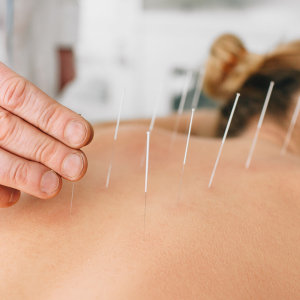
The Role of Acupuncture in Modern Wellness Routines
In today’s fast-paced world, wellness has become a priority for many individuals looking to achieve balance in their physical, mental, and emotional health. Among the myriad of wellness techniques available, Acupuncture has emerged as a popular and effective therapy. Rooted in traditional Chinese medicine (TCM), Acupuncture involves the insertion of fine, sterile needles into specific points on the body to stimulate energy flow, or “qi” (pronounced “chee”). While it has been practiced for thousands of years, Acupuncture has seamlessly integrated into modern wellness routines, offering a holistic approach to health and healing.
What is Acupuncture?

Acupuncture is a key component of traditional Chinese medicine, developed over 3,000 years ago. According to TCM, the body contains pathways called meridians through which energy, or qi, flows. When this energy is blocked or imbalanced, it can lead to physical or emotional ailments. Acupuncture works by stimulating specific points along these meridians to restore balance and promote the body’s natural healing processes.
Modern science has found that acupuncture has physiological effects as well, such as stimulating nerves, muscles, and connective tissues, improving blood flow, and triggering the release of endorphins, the body’s natural painkillers.
Why Acupuncture Fits into Modern Wellness Routines

With increasing awareness about the importance of preventative care and natural therapies, Acupuncture has found its place in contemporary wellness for several reasons:
A Holistic Approach to Health: Acupuncture doesn’t just focus on treating symptoms; it addresses the root causes of imbalances in the body. This makes it particularly appealing in today’s wellness landscape, where people are shifting toward holistic care that considers the body, mind, and spirit.
Non-Invasive and Drug-Free: As concerns over the side effects of medications grow, Acupuncture offers a natural, minimally invasive alternative for managing various conditions. It is often used to reduce reliance on painkillers, making it an attractive option for people looking to avoid pharmaceuticals.
Stress and Anxiety Management: One of the primary reasons people turn to Acupuncture in modern times is its ability to reduce stress and promote relaxation. By calming the nervous system, Acupuncture helps reduce cortisol levels and improve mood, making it a valuable tool for combating the stresses of daily life.
The Benefits of Acupuncture in Wellness
Acupuncture provides a wide range of benefits that make it an effective addition to modern wellness routines:
Pain Relief
Acupuncture is widely recognized for its ability to manage and alleviate pain. It is commonly used to treat:
Chronic conditions like back pain, migraines, and arthritis.
Injuries such as sprains, strains, and sports-related discomfort.
By stimulating the release of endorphins and improving circulation, Acupuncture helps reduce inflammation and promote healing.
Improved Sleep Quality
Acupuncture can help regulate sleep patterns by addressing imbalances in the body and calming the mind. It is particularly effective for individuals suffering from insomnia, sleep apnea, or general restlessness. Regular sessions can improve both the duration and quality of sleep.
Boosted Immunity
By promoting better circulation and supporting the body’s natural defenses, Acupuncture strengthens the immune system. It helps prevent illnesses and speeds up recovery from infections or seasonal allergies.
Stress and Mental Health
Acupuncture has shown to be effective in reducing anxiety, depression, and emotional imbalances. By targeting specific points on the body, it helps regulate the nervous system, improve mood, and enhance overall mental well-being.
Improved Digestive Health
Acupuncture can support gut health by addressing issues like bloating, indigestion, constipation, and irritable bowel syndrome (IBS). It helps regulate the digestive system and restores balance to the gastrointestinal tract.
Women’s Health
From managing menstrual pain and irregular cycles to supporting fertility and reducing menopausal symptoms, Acupuncture is a powerful tool for women’s health. It is often used in conjunction with fertility treatments to improve outcomes.
Incorporating Acupuncture Into Your Routine
Acupuncture is highly adaptable and can be tailored to fit individual needs. Here’s how you can incorporate it into your wellness routine:
1. Preventative Care
Many people use Acupuncture as a form of preventative care, attending regular sessions to maintain balance and prevent health issues before they arise. For example, scheduling monthly sessions can help manage stress, boost immunity, and maintain energy levels.
2. Complementary Therapy
Acupuncture works well alongside other treatments and therapies, including physical therapy, chiropractic care, and massage. It can also complement conventional medical treatments for chronic conditions, improving outcomes and enhancing quality of life.
3. Self-Care and Relaxation
Incorporate Acupuncture as part of your self-care routine to promote relaxation and mental clarity. Many clinics offer calming environments that enhance the therapeutic experience, making each session a rejuvenating escape from daily stresses.
How Acupuncture Aligns with Modern Techniques
Acupuncture is increasingly combined with other modern wellness practices for a more integrated approach to health. For instance:
Acupuncture and Cupping: Combining these therapies enhances muscle relaxation, improves circulation, and reduces pain.
Acupuncture and Nutrition: Many acupuncturists offer dietary guidance based on TCM principles to further support wellness.
Electroacupuncture: A modern twist on traditional Acupuncture, this technique involves passing mild electrical currents through the needles for enhanced stimulation, particularly useful for pain management and muscle recovery.
Finding the Right Practitioner
To reap the full benefits of Acupuncture, it’s important to work with a licensed and experienced practitioner. A qualified acupuncturist will take a comprehensive approach, understanding your medical history and personal goals before creating a tailored treatment plan.
Acupuncture is no longer viewed as just an ancient practice; it has evolved into a sophisticated therapy that addresses the demands of modern life. Its ability to manage pain, reduce stress, and promote overall well-being makes it an invaluable addition to any wellness routine.
Incorporating Acupuncture into your life is not just about addressing specific issues—it’s about fostering balance and harmony in the body and mind. Whether you’re looking for relief from chronic conditions, managing stress, or simply seeking to maintain your health, acupuncture offers a safe, effective, and natural solution that aligns perfectly with today’s holistic approach to wellness.
Make Acupuncture a part of your wellness journey, and discover how this ancient practice can bring balance, energy, and vitality into your modern life.



Leave A Comment